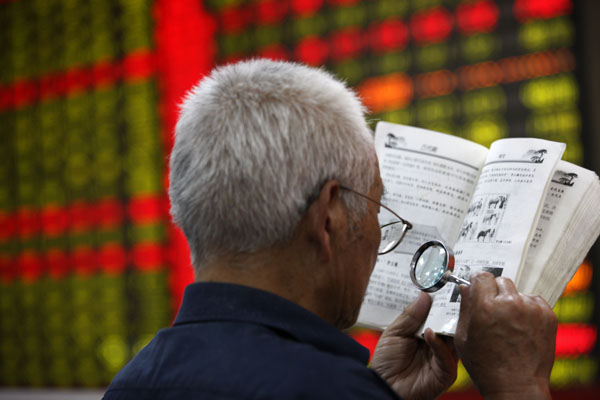 |
|
An investor at a securities firm in Huaibei city, East China's Anhui province on Sept 22, 2014. [Photo/Aisanewsphoto] |
Bank of America Corp strategist David Cui has a laundry list of support measures that China's government might deploy to fight the steepest stock market rout since 1996.
It could halt initial public offerings, encourage insurers to buy shares, ease access to margin financing, reduce stamp duties or cut lending rates-just to name a few.
The problem for bulls, Cui said, is that none of those measures are likely to spark a sustained rally at a time when margin traders are unwinding a record buildup of leveraged bets. His year-end target for the Shanghai Composite Index implies a drop of 11 percent from Monday's close.
"The margin call, forced sale, margin call vicious cycle can quickly develop a momentum of its own," Cui, the head of China equity strategy at Bank of America, said in an e-mail on Monday.
Doubts about policymakers' ability to prop up the world's second-largest stock market are spreading after a weekend interest rate cut and speculation that regulators will halt IPOs failed to prevent the market from tumbling. The gauge would need to fall another 13 percent to match its average downturn since 1990.
The stocks, however, rallied on Tuesday, with the Shanghai Composite Index rising for the first time in four days, jumping 5.5 percent to 4,277.22 points at the close, the most since March 2009. The gauge swung 432 points between its high and low points, propelling a volatility measure to a seven-year peak.
"Any support the government can provide would be short-lived," said Chad Padowitz, the Melbourne-based chief investment officer at Wingate Asset Management Ltd. "The only real support they can provide over time is providing a reasonably balanced, growing economy. That is the best thing they can do. Anything they do short-term, decreasing interest rates to support the market or things like that, are somewhat foolish."
The increasing role of leverage in stock trading in the Chinese mainland is making it especially hard for authorities to control swings in what has become the world's most volatile market after Greece, according to Paul Chan, the Hong Kong-based chief investment officer for Asia ex-Japan at Invesco Ltd.
Margin debt on the Shanghai Stock Exchange fell for a sixth day on Monday to 1.36 trillion yuan ($219 billion), the longest stretch of declines since June 2014, while the benchmark gauge's 10-day volatility reading jumped to the highest since 2008. A five-fold surge in leveraged wagers had helped propel the Shanghai index to a more than 150 percent gain in the 12 months through June 12.
Zhang Xiaoxi, a 29-year-old designer in Chongqing, said there is nothing the government can do to convince her that stocks are a safe bet. "I've lost faith," said Zhang, who has liquidated her 20,000 yuan investment in shares.
"With the policy catalysts, the government is just creating a false illusion that the bull market has not ended. It might introduce further measures or policies, but they will not have much effect."
Not everyone is so pessimistic. Huang Haiqiao, who works in the finance industry in Hangzhou, Zhejiang province, is sitting tight on his more than 100,000 yuan of equity holdings.
"The government is clearly trying to prop up stocks," he said. Policymakers "will take further steps, including cuts in interest rates and reserve requirement ratios, allowing social security funds to invest in stocks and possibly lowering the stamp duty."
